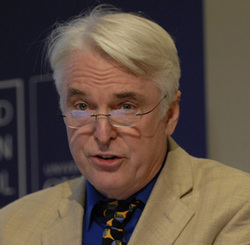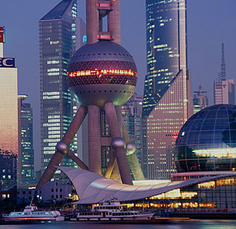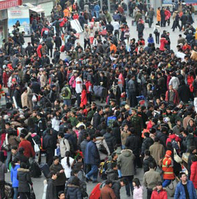Oxford China Academics
Oxford In China > Oxford China Academics > Steve Rayner
The Future City

Professor Steve Rayner is the James Martin Professor of Science and Civilization at the University of Oxford, Director of the Institute for Science, Innovation and Society, Co-Director of the Oxford Martin Programme for the Future of Cities and Co-Director of the Oxford Geoengineering Programme.
For more than two decades, Prof. Rayner has led interdisciplinary research programmes on science, technology and the environment. He is the recipient of numerous awards, including the 25th Homer N. Culver Award from the American Public Health Association, the Pacific Northwest National Laboratory Director’s Award for R&D Excellence and twice the recipient of the Martin Marietta Energy Systems Awards for groundbreaking work in risk analysis and global climate change policy analysis. He was listed in Wired Magazine’s 2008 Smart List as ‘one of the 15 people the next US President should listen to’.
Prof. Rayner will be delivering the inaugural Oxford China Lecture in Shanghai on 10 December, speaking on 'The Future City: Climate Change, Technology and the New Urbanisation'. Bookings are now open.
For the highlights of the video interview with Prof. Rayner, please click below.
For more than two decades, Prof. Rayner has led interdisciplinary research programmes on science, technology and the environment. He is the recipient of numerous awards, including the 25th Homer N. Culver Award from the American Public Health Association, the Pacific Northwest National Laboratory Director’s Award for R&D Excellence and twice the recipient of the Martin Marietta Energy Systems Awards for groundbreaking work in risk analysis and global climate change policy analysis. He was listed in Wired Magazine’s 2008 Smart List as ‘one of the 15 people the next US President should listen to’.
Prof. Rayner will be delivering the inaugural Oxford China Lecture in Shanghai on 10 December, speaking on 'The Future City: Climate Change, Technology and the New Urbanisation'. Bookings are now open.
For the highlights of the video interview with Prof. Rayner, please click below.
I'm both honoured and delighted to be delivering the first Oxford China Lecture in Shanghai in December 2013. The lecture will bring together two very large issues facing the world today. One is climate change, and the other is the issue of urbanization. We're in the middle of the biggest migration in human history - the migration of people from the countryside into the towns. Part of the argument that I will make in the lecture is that this is a very good thing for people, and a very good thing for the environment.
It's very fortunate that I am going to be able to deliver this lecture in China, because China is absolutely on the cutting edge of the development of new cities with wonderful new opportunities for transforming the ways in which people live. One the ways is with respect to the use of energy which is the primary forcing agent for climate change. This is how these two issues are linked together in my mind - how can we take advantage of the trend towards urbanization as a way to actually resolve a lot of the issues that we face with climate change? This means designing infrastructure and buildings in way where energy needs can be reduced; it also means adapting cities, ensuring that they are capable of dealing with the inevitable degree of climate change that we are going to encounter, despite our best efforts at mitigating greenhouse gas emissions.
One of the problems with urbanization on the global level is that life in the city is often perceived as being worse than life in the countryside. This is a common error. The error is made because of the concentration of people in cities. If you actually hold wealth constant, you find that in almost every single index you can think of, people are better off in urban environments than in the countryside. There is generally less suicide, fewer industrial accidents, better health and longevity, better personal security, and so forth. People often say they experience poverty in the cities, but it’s not that cities make people poor; it’s that they are better places to be poor. Cities are usually places where the poor get to be rich, or at least richer than they were in the countryside.
Jane Jacobs called the city "an immense laboratory". There are many ways in which we can conduct the research in an urban context. Sustainability has been seen largely in the past in terms of damage limitation, which is a discourse of constraints. What we really need is a discourse of opportunity. The idea of generative sustainability is the building of infrastructure and human communities that provide improvements to the natural environment as well to human welfare. Universities are able to do this on an experimental scale, because they have control over the planning, the way that the infrastructure they construct links together in order to provide experimental test beds for new technologies, new modes of transportation, information technology and teaching.
It's very fortunate that I am going to be able to deliver this lecture in China, because China is absolutely on the cutting edge of the development of new cities with wonderful new opportunities for transforming the ways in which people live. One the ways is with respect to the use of energy which is the primary forcing agent for climate change. This is how these two issues are linked together in my mind - how can we take advantage of the trend towards urbanization as a way to actually resolve a lot of the issues that we face with climate change? This means designing infrastructure and buildings in way where energy needs can be reduced; it also means adapting cities, ensuring that they are capable of dealing with the inevitable degree of climate change that we are going to encounter, despite our best efforts at mitigating greenhouse gas emissions.
One of the problems with urbanization on the global level is that life in the city is often perceived as being worse than life in the countryside. This is a common error. The error is made because of the concentration of people in cities. If you actually hold wealth constant, you find that in almost every single index you can think of, people are better off in urban environments than in the countryside. There is generally less suicide, fewer industrial accidents, better health and longevity, better personal security, and so forth. People often say they experience poverty in the cities, but it’s not that cities make people poor; it’s that they are better places to be poor. Cities are usually places where the poor get to be rich, or at least richer than they were in the countryside.
Jane Jacobs called the city "an immense laboratory". There are many ways in which we can conduct the research in an urban context. Sustainability has been seen largely in the past in terms of damage limitation, which is a discourse of constraints. What we really need is a discourse of opportunity. The idea of generative sustainability is the building of infrastructure and human communities that provide improvements to the natural environment as well to human welfare. Universities are able to do this on an experimental scale, because they have control over the planning, the way that the infrastructure they construct links together in order to provide experimental test beds for new technologies, new modes of transportation, information technology and teaching.
|
China is at the forefront of constructing new cities. This presents a wonderful opportunity for the development of different kinds of infrastructure and the incorporation of new technologies, alternative ways of providing energy and of organizing the physical layout of the city to ensure that people can get the satisfaction that they need from living the city without having to travel large distances, which also wastes large amounts of their time. All of these are present in China at the present moment.
One of the most interesting things about cities is that they are historically centres of creativity but they are also prone to path-dependency. Cities are where universities are built, they're usually built at crossroads, or estuaries, with trading points - where information flows, and they're vibrant places that produce new ideas and new ways of living and working. |
At the same time, as soon as you start to lay down the physical infrastructure of the city - the roads and the buildings - you tend to lock into very long time scales. The road plans of the City of London are essentially the road plans that were laid down in Roman times. The paradox is that the city is the centre of dynamic innovation and change, and at the same time it has forces which are very slow to change. The physical characteristics of cities like Shanghai or London or Paris or New York are very distinctive and people identify strongly with them. On the one hand you want cities that are constantly updating themselves so that they can provide modern amenities to their citizens, but at the same time you want to preserve that sense of place which is embodied in the physical structure.
A lot of the work that we're focused on in the Future of Cities programme at Oxford is actually trying to reconcile these two very important aspects of the city. It is an important time to be doing this all over the world. In China there is the development of new cities and very rapid urbanization, and in India there is also a lot of urbanization but with a very different kind of model. There is also the challenge of renewing older cities, particularly in the west. There is a lot of study being done on urban development, but the problem is that it tends to be divided into intellectual and disciplinary silos. We see the city as studied by urban planners, sociologists, by geographers, by economists, engineers etc, but they are all looking at a different object when they look at the same city. The big challenge for the Oxford programme is trying to overcome this separation of insights and learning that we have about the city into different and sometimes even competing different disciplinary silos.
|
The last decade has seen a huge transformation at Oxford University. When I first arrived, the very strong disciplinary traditions of Oxford which have made it a centre of excellence were dominant and there weren’t many vehicles for interdisciplinary work. But now we have the Oxford Martin School and other entities which are actually drawing people across the campus – a very rapid development in interdisciplinary capacity at Oxford. If you combine that with its traditional disciplinary strength - that’s where Oxford has a comparative advantage. |
The period since the Kyoto protocol has demonstrated that the initial architecture of that arrangement for dealing with climate change could not possibly deliver what was expected of it. Attention is now being placed on more decentralized, bottom-up strategies for dealing with climate change. These throw the city right into the centre of the climate change issue. In many parts of the world, particularly the United States, it has been the city governments rather than federal governments that have taken the initiative to develop and implement programmes both for reducing greenhouse gas emissions and for improving the adaptability of their cities to climate change, and that is already reflected on an international scale. Major Chinese cities such as Shanghai and Beijing are participants in these international networks of cities who are directly working to resolve the climate change problem, in a way that is actually far more difficult for national governments, who always have to place their national interests above those of the locale and of the global.
This international networking of cities around climate change is enabling experimentation and learning about how to deal with climate change. Ironically that was the original framework prior to Kyoto that was being proposed, that nation states would experiment according to their national capabilities, recognizing their difference in economic situations, resource basis, populations, geographies, climatic and ecological conditions. This would enable a process of global social learning to take place. Since Kyoto threw that out the window, it has been at the city level that global social learning has been reintroduced, bottom up, in a very healthy development.
This international networking of cities around climate change is enabling experimentation and learning about how to deal with climate change. Ironically that was the original framework prior to Kyoto that was being proposed, that nation states would experiment according to their national capabilities, recognizing their difference in economic situations, resource basis, populations, geographies, climatic and ecological conditions. This would enable a process of global social learning to take place. Since Kyoto threw that out the window, it has been at the city level that global social learning has been reintroduced, bottom up, in a very healthy development.
|
The approach to climate change that I and my colleagues have taken inverts the current logic to try and motivate people. Rather than approach climate directly as an environmental problem to be solved, we have to approach with a strategy for energy modernization. We want to move away from fossil fuels, from coal and also from oil, for many good reasons, including the incredible cost of air pollution on the population. Improving that situation improves people’s health and the economy. We are also in a situation where about 1.5 billion of the world population doesn’t have access to safe and reliable electrical power. Providing them access to power without frying the planet is a strong motivation for technological innovation.
|
Ultimately I’m optimistic about the future. Human beings are incredibly ingenious and adaptable. We have lived with very simple technologies in extraordinarily different environmental conditions, from Inuits living in the Polar regions to the Bushmen of the arid Kalahari. The human race will adapt to changes in climate conditions on the planet. The question is not whether we can stop climate change, but where we can limit climate change through emissions mitigation. What I’m more concerned about is the transition costs and their impact on people, inevitably those living in marginal situations, who will be squeezed in the middle of change from the current way of life to the future.
Interviewed in September 2013
Interviewed in September 2013



